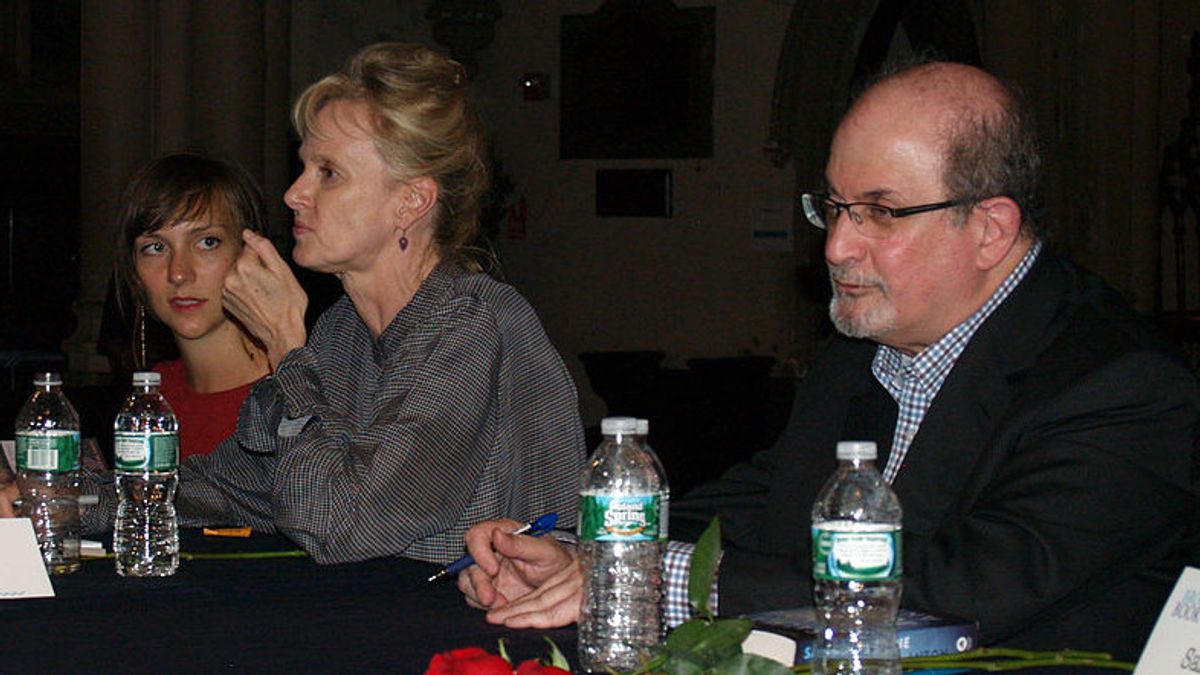JAKARTA - On December 26, 1990, Iran's spiritual leader, Ayatollah Ali Khamenei, issued a fatwa on the death penalty against a writer named Salman Rushdie. Ayatollah Khamenei said the blasphemy charges would remain in place. While Rushdie refused to express regret for writing the novel The Satanic Verses, a novel deemed offensive to Muslims.
The novel contains at least references to mocking the Prophet Muhammad and other aspects of Islam, as well as characters that are clearly based on Iran's Supreme Leader. On February 14, 1989, Ayatollah Ruhollah Khomeini, issued the strongest response, calling on "all brave Muslims" to kill Rushdie and his publishers.
Quoting the BBC, Saturday 26 December, Radio Tehran quoted Ayatollah Khameini as saying that his predecessor Ayatollah Ruhollah Khomeini's decision "remains unchanged even if he repents and becomes the most pious man of his time." The Indian-born novelist has been hiding under police custody since Ayatollah Ruhollah Khomeini ordered the death penalty on February 14, 1989.
While much of the most controversial things said about Islam and Muhammad in the book come from the mouths of comic book characters, they are undeniably derogatory. It is depicted that the Prophet Muhammad spoke the words Satan instead of God, and many were furious at the depiction of a brothel in which the prostitutes had the same name as the Prophet Muhammad's wife.
Salman Rushdie then reportedly converted to Islam on Christmas Eve. He separated himself from the anti-Muslim sentiments expressed by the characters in his book. His decision came after talks with moderate Muslims, including Egyptian officials, and was an attempt to smooth out his differences with the Islamic community and come out of hiding.
Convert to IslamRushdie said he believed it was "the beginning of the end" for the death threats and he promised not to allow any further translations of The Satanic Verses. He also promised to keep trying to better understand Islam.
But Ayatollah Khamenei was adamant that the "divine judgment" was irreversible. Ayatollah Khamenei said the efforts of "certain fake Muslims" would not change Iran's 1989 fatwa.
Ayatollah Khamenei inherited the robe of supreme spiritual guide for the Iranian revolution when Ayatollah Khomeini died in June 1989 and his authority was unlikely to be challenged in Iran. Ayatollah Khomeini, who succeeded in overthrowing the US-backed monarch a decade earlier, was the leader of a group of clerics who had turned Iran into a theocracy. Because of that, he was perhaps the most prominent Shia authority in the world.
Muslims around the world condemn The Satanic Verses. The novel was publicly burned in Bolton, England, sparking deadly riots in Pakistan and is completely banned in many Muslim countries. But Khomeini's fatwa took controversy to new heights.
Mohammed Siddiqi, leader of the British Muslim Youth Movement, reiterated demands for the withdrawal of all copies of The Satanic Verses. He also promised that the novel would never be published in any form.
The British Action Committee on Islamic Affairs acknowledged that Rushdie had taken steps in the right direction to decide to pursue Islam. But the committee also said Rushdie should have pulled The Satanic Verses out of circulation.
Rushdie was knighted in 2007. That year he said he saw the fatwa as "a piece of rhetoric and not a real threat." While Rushdie remains unharmed, the reactions to his novel are responsible for many deaths and injuries worldwide. It has become one of the deadliest examples of conflict between religious fundamentalists and freedom of speech activists in the 20th century.
The English, Chinese, Japanese, Arabic, and French versions are automatically generated by the AI. So there may still be inaccuracies in translating, please always see Indonesian as our main language. (system supported by DigitalSiber.id)









